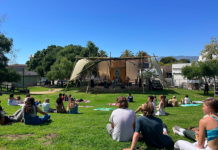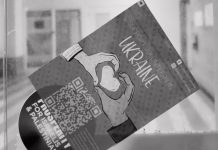Giuseppe Ricapito
IV Beat Reporter
University of California, Santa Barbara’s new Policy and Procedure regulations regarding smoking tobacco and unregulated nicotine products will go into effect Jan. 1, 2014, effectively banning the use of cigarettes, chewing tobacco, and electronic smoking devices on all campus-owned locations.
Former UC President Mark Yudof precipitated the tobacco ban in a 2012 letter to UC chancellors, declaring that “a smoke-free environment will contribute positively to the health and well-being of all UC students, faculty, staff and our patients and visitors.”
A UC Smoke & Tobacco Free FAQ indicates that 10 percent of UC employees and 8 percent of UC students smoke. The official UCSB press release provides statistics on national mortality rates, respiratory health effects, and the environmental impact of disposed, non-biodegradable cellulose acetate filters.
Ashkon Rahbari, a third-year biology major and non-smoker that sits on UCSB’s Smoke-Free Steering Committee as a liaison to the Associated Students president’s office, explained the mandate of the board at UCSB.
“This committee isn’t here to discuss the policy of smoking bans…it’s basically an advertising campaign,” Rahbari said. “How are we going to get students involved? How can we get this message out to reach the most students? How are we going to analyze data at the end of it all and see how effective it has been?”
But the question of on-campus smoking furnishes a variety of reactions in students. The majority of the student population falls into the category of “non-smokers,” but outdoor dilution leaves many apathetic to the few smokers that actually crop up.
“I feel like there should be designated areas where smokers can go and maybe be more separated from people that don’t,” said Michael Patty, a political science major and non-smoker. “But I just don’t think that an all-out ban is the best bet.”
Many students seem to be accommodating of either lifestyle choice, but their willingness to compromise falls outside of the UC-wide mandate.
J. Lee, a fourth-year biopsychology major, registered mixed feelings.
“Where else would I be able to smoke, especially during midterms and finals?” Lee said. “Then again, I understand other people, too, because a lot of my friends aren’t smokers and they hate it when smokers are around.”
The Smoking Policy Subcommittee of the Occupational Wellness Forum (UC-wide) submitted a “Smoke-free Policy Proposal” that included plans for implementation, smoking cessation (patches, gum, etc.), and even provided data that attests to campus smoke-free policies as catalysts for changing individual behavior. The document is prefaced with an anonymously attributed “UC Student” — it envisions “an environment where we can all breathe easier — literally. And it would feel good just knowing that everyone is making an effort to have a healthy campus.”
UC administrators have credited the smoking ban as a positive step toward university health, but it brings up the question of whether the UC has rightful grounds to mandate the abstention from certain behaviors.
An Op-Ed piece for the Daily Bruin at UC Los Angeles suggests that this ban is an infringement on student freedom. It states that “the new policy minimizes individual choices” and offers the compromise of designated smoking areas.
The California Review, a self-ascribed conservative student-newspaper at UC San Diego, also weighed in.
“In implementing what is ‘beneficial,’ the state invasively seeks to influence personal behavior, stripping people of their right to lifestyle choices,” an article states.
Rahbari acknowledged these concerns, saying, “Nobody can say that it doesn’t restrict a freedom — it does restrict the freedom to smoke.” But as the first day of implementation draws closer, he added that he has “to look at it on a pragmatic level.”
When the day does arrive, students must be compelled by campus participation to adhere to the new rule. The current information from the UCSB Policy and Procedure press release does not indicate any means of enforcement besides “personal responsibility” and “department heads” handling issues of “noncompliance” within their “area.”
Rahbari explained that the committee’s system — detailed in the terminology of “educational enforcement” in the “Smoke-free Policy Proposal” — might not be effective in curbing the habit of avid smokers.
“The problem is they’re not issuing citations,” Rahbari said. “If anything, I think people will go to remote areas and still smoke.”
“Educational enforcement” applies more appropriately to the public advertising being undertaken by the UCSB Smoke-free Committee. Rahbari indicated that present strategies ranged from “butt counts and litter collections” to “’No Smoking’ banners” and monitoring of smoking “hot-spots.”
The smoke-free policy is intended to be a campus-wide health measure, but the smoker minority at odds with this idealism may legitimize claims of individual use above a moral cause for the common good. Expect to see smokers hidden in shrubby, alcoves, or in the shadow of stone pillars, keeping their eyes out for well-intentioned solicitors as they wave away bands of smoke.
















